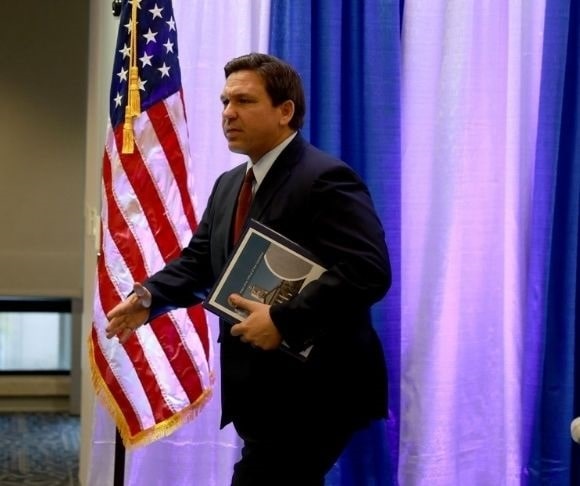Mr. and Mrs. Mickey Mouse are poised to write their biggest check yet as the governor of Florida toys with putting the kibosh on special districts. If legislators agree during the special session called by Governor Ron DeSantis, the Sunshine State will remove the rule – a loophole, for lack of prettier prose – that allows Walt Disney World to operate as if it were its own city, resulting in quite the economic kablooey for the company. GOP lawmakers are heading to Tallahassee to teach the Mouseketeers a hard lesson for pushing a woke political agenda, and really, the folks at Disney should have seen this coming.
Last month, DeSantis hinted the Magic Kingdom might be in trouble during a presser: “What I would say as a matter of first principle is I don’t support special privileges in law just because a company is powerful, and they’ve been able to wield a lot of power. [T]here’s a lot of these special privileges that are not justifiable, but because Disney had held so much sway, they were able to sustain a lot of special treatment over the years.”
Earlier this week, DeSantis turned the hint into a threat, saying the state legislature would be considering all special districts, including Reedy Creek Improvement District.
How’s that for a wake up call?
What’s At Stake?
Enacted in 1967 by the Florida state legislature to lure tourism and economic development, the Reedy Creek Improvement District gives Disney 25,000 acres of self-governing authority. A board of supervisors, made up of five high-ranking Disney employees who each owns an undeveloped five-acre parcel, makes decisions on behalf of the kingdom. These bigwigs can levy taxes, write building codes, develop infrastructure, and build whatever suits them. How about a shiny new LGBTQ learning center for kids? But seriously, they have the power to shove in another airport or even construct a nuclear power plant. That’s a lot of power.

(Photo by AaronP/Bauer-Griffin/GC Images)
What will happen if Reedy Creek is terminated? A couple of noteworthy results are under consideration. First, local taxpayers will reportedly reap the benefit that Disney is paying into the district without any tax increase. The second significant change will be how Disney gets to do business. For instance, if the company wanted to expand, build, or even add a new gate into the park, it would have to jump through the same hoops that other corporations in Florida routinely face.
Republican Rep. Randy Fine offered his two cents on repealing the law: “Disney is a guest in Florida. They’re a California company that has California values.” That can be translated into: Stop pushing LGBTQ down Florida’s combined electoral throats – harkening back to the legislature recently passing bills that would keep teachers from talking to tender-age children about transgender identity, gay, lesbian, and other sorts of sexual preferences, of course.
Disney made a stand, accusing Republicans of being racist and mean. In a published statement, the Kingdom scribed: “Our goal as a company is for this law to be repealed by the legislature or struck down in the courts, and we remain committed to supporting the national and state organizations working to achieve that. In addition, we are dedicated to standing up for the rights and safety of LGBTQ+ members of the Disney family, as well as the LGBTQ+ community in Florida and across the country.”
That torqued off the governor, the more conservative folks in the state, and several of the many elected lawmakers. And when a majority of Sunshine Staters agree with the legislation, Disney may have made a big oops.
Disney: Was That a Hornet’s Nest?

Matt Gaetz (Photo by Joe Raedle/Getty Images)
Rep. Matt Gaetz (R-FL) is strongly pressuring the state to readjust another tax loophole that Disney uses. As Gaetz nearly bellowed, “If Mickey’s ears are purchased in Orlando, that revenue shouldn’t find itself taxable in Delaware through nifty accounting and outdated laws. Combined reporting is hardly a tool of liberals. The nonpartisan Florida Revenue Estimating Conference says that this measure would have a recurring impact of $591.7 million on Florida’s budget. That’s $591.7 million that Florida Man and Florida Woman have to shoulder because Disney has fancy lawyers, lobbyists, and accountants.” The company grossed $72.9 billion last year.
But wait, the Pluto pile got even denser when a congressman from Indiana took a swing at the ears. House Republican Study Committee (RSC) Chairman Jim Banks (R-IN) said he would fight to end the Mickey Mouse copyright expiring on January 1, 2024.
Fine is confident that Disney will finally get what’s coming:
“Universal doesn’t get these. Legoland doesn’t get these. SeaWorld doesn’t get these. And then they want to disrespect the voters of the state on a bill that is overwhelmingly approved by every demographic, including Biden voters. Well, you know, when my kids ask for special privileges, they don’t act like jerks.”
If DeSantis, Fine, Banks, and Gaetz have their way, the exclusive Mickey Mouse Club will soon feel the wrath of people done with these pandering woke companies. And, if they can land a blow on the face of Disney World, the sky is the limit. Who’s next?








